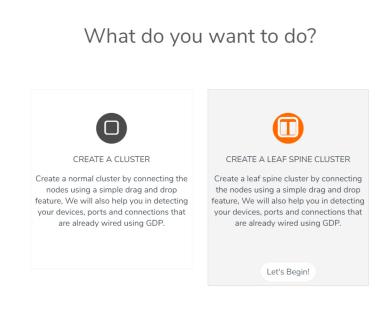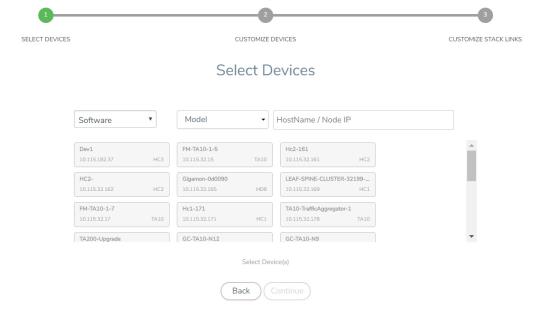Leaf-Spine Cluster Formation Workflow
GigaVUE‑FM 5.3 supports workflow-based configurations for forming a cluster. This workflow walks through the required steps to form a complete Leaf-Spine cluster. Additional procedures for editing and deleting cluster formations are also provided:
Create a Leaf-Spine Cluster
To create a Leaf-Spine cluster:
|
1.
|
On the left navigation pane, click  , and then select Physical > Nodes. , and then select Physical > Nodes. |

Select the Cluster Type
|
3.
|
The Create a Cluster screen opens with two options: |
|
o
|
CREATE A LEAF SPINE CLUSTER |
|
4.
|
Hover over the CREATE A LEAF SPINE CLUSTER option and click Let’s Begin to start the wizard. |

Select Devices
The wizard guides you through the cluster set-up. The first step is to select the devices in your cluster.
|
5.
|
The Select Devices page displays a list of standalone devices with filter options: |
|
o
|
Software: Filter the nodes based on the software version for which the cluster will be formed. |
|
o
|
Model: Filter the nodes based on a Gigamon model. |
|
o
|
HostName: Enter the HostName of the Gigamon Nodes to specify a device. |

Select the nodes to include in this cluster and click Continue.
|
6.
|
Click a device to select it. Click it again to deselect it. Selected devices are highlighted. |
Customize Devices
Use the Cluster Configuration window to customize your devices.
|
7.
|
Enter a valid Cluster ID and VIP and select the leader in the Seed Node list. |
Note: TA devices cannot be a leader.
|
8.
|
After completing the Cluster Configuration details, click Continue. |
Note: Use the Back button to return to the Select Devices page to revise the selection of devices for this cluster.
Customize Stack Links for your Leaf-Spine configuration
Finally, customize the stack links to define how the nodes should be connected.
|
9.
|
If GDP (Gigamon Discovery Protocol) is enabled at the device chassis level, then the corresponding ports used to create links and ports should be admin enabled. If a physical connection exists in the device, then the links will be shown. |
|
10.
|
If GDP is not enabled in the ports, then the links will need to be drawn to connect the devices. |
Connect Leaf devices with Spine devices to create a stack link between them.
Click the tip of the node and drag your cursor to the second node tip to create a link. After you create the link, a dotted line will illustrate the connection.
|
11.
|
Configure the formed links in the Stack Links table as follows: |
|
o
|
Select ports in each device that are compatible, for example: x-x ports ,x-q ports, q-c ports, x-c ports. |
|
o
|
Select two or more ports in each device to create a stack GigaStream. |
|
o
|
After selecting the ports, save the stack link by clicking Save button enabled in the right of stack link table. |
Stack GigaStreams and stack links can act as a spine link between the devices. The alias for stack link and GigaStream is auto generated by GigaVUE‑FM. This alias can be edited as needed.
|
12.
|
After the required Stack Links and GigaStreams are created and saved, click Continue to start the cluster creation process. |
The Creating Cluster page appears as the cluster is being created.
The Create Cluster progress window in the lower right corner of the page shows the status of every node as it joins the cluster. It takes a few minutes for the cluster to form. The cluster creation process involves the following steps:
|
o
|
Cluster[clusterName] Creation Successful followed by Seed device |
|
o
|
Verifying Nodes[Will display HostName of all devices] |
|
o
|
Adding Node[HostName] to cluster [clusterName] |
|
o
|
Node[HostName] successfully joined to the cluster. |
|
o
|
Configuring cards for cluster[clusterName] |
|
o
|
Rediscovering cluster[clusterName] |
|
o
|
Configuring ports for cluster[clusterName]. |
|
o
|
Configuring ports will display the status of each stack link and GigaStream whether the creation is successful or not. |
When the cluster formation process is complete the notification window will display a, “Create Cluster Competed,” message.
|
13.
|
Click Go to Cluster to view the cluster overview. |
Edit a Cluster
The Edit cluster option supports only the following operations to the existing cluster:
|
■
|
Multiple devices can be added to the existing cluster in a single update operation. |
|
■
|
Multiple devices can be added as Leaf, Spine, Leaflet. |
|
■
|
Stack links can be created only from the new device which is added into the cluster wizard. |
|
■
|
Leader preferences can be changed for each device through edit cluster option. |
|
■
|
Stack link alias and GigaStream alias can be edited for newly created links. |
Note:
|
■
|
No option to remove the existing stack links through cluster wizard. |
|
■
|
No option to create links in existing devices. |
|
■
|
Addition and deletion of devices in a single update operation should not be appreciated. |
|
■
|
No option to edit the existing stack link alias and GigaStream alias. |
Prerequisites
Standalone devices that have maps cannot be added to cluster if ports used in maps overwrites with the selected ports in stack link table.
This workflow describes how to add a node to a cluster.
|
1.
|
Select a cluster and choose Actions > Edit cluster. |

|
2.
|
The Edit Leaf Spine Cluster Canvas displays the existing stack link configuration details in the cluster wizard canvas. Standalone devices are listed under the Devices pane. |
|
3.
|
Drag the required devices from the devices pane into the cluster wizard under the leaf or spine container. |
|
4.
|
Draw the links between the newly added device. (Note: no new link is created for the existing device.) |
|
5.
|
Configure the stack link details in the stack link table. |
|
6.
|
After selecting the ports, save the stack link by clicking Save in the stack link table |
|
7.
|
Click Update to initiate the update process. |
|
8.
|
When prompted by the Confirmation message, click OK to run the cluster update. |
When the cluster update operation starts, a notification window will appear at the right corner of the GigaVUE‑FM window to show the status progression of each node, card, GigaStream and stack link.
When the cluster update operation is completed, “Manage Cluster Completed,”will appear in the in the Manage Cluster notification window.
|
9.
|
Click Go to Cluster to go to view the cluster overview. |
The created GigaStreams will appear in the device Port Groups page, and the created stack links will appear in the device Stack Links page.
Delete a Node from a Cluster
This workflow describes how to remove a device node from a cluster.
Note: Only one device can be removed from the cluster per update operation.
The device should not contain any map configurations in a cluster. Those devices cannot be removed until the maps are present.
|
1.
|
Select a cluster and choose Actions > Edit cluster. Only one device can be deleted from the canvas. It can be either Leaf, Spine or Leaflet. |
|
2.
|
To remove a device, right-click the device to be removed from the canvas and click Remove. |
The removed device will be deleted from canvas.
|
3.
|
Click Update to initiate the cluster-update operation. |
The Manage Cluster notification window shows the progress of nodes being removed from the cluster.
When the device is successfully removed from the cluster, a “Manage Cluster Completed,” message will appear in the notification window.
|
4.
|
Click Go To Cluster to go into device overview page and see the cluster details. |
How to Change the Leader Preference of a Device
This workflow describes how to change the device’s leader preference.
|
1.
|
Select a cluster and choose Edit cluster under Actions. |
|
2.
|
To set the leader preference for a device, right-click the device and click the Edit Details option. |
|
3.
|
Click a device in the Edit Leaf Spine Cluster canvas to display the device configuration quick view. |
|
4.
|
Update the leader preference text box and click Update to proceed. |
The Manage Cluster notification will appear to show the progress of the cluster update. When the process is complete, a “Manage Cluster Completed,” message will appear in the notification window.
|
5.
|
Click Go To Cluster to go to the device overview page and see the cluster details. |
 , and then select Physical > Nodes.
, and then select Physical > Nodes.






